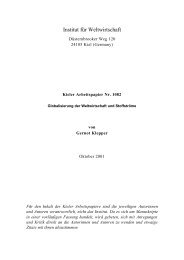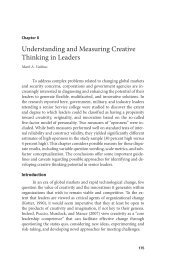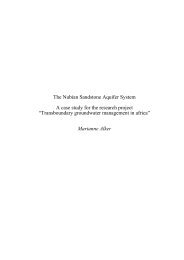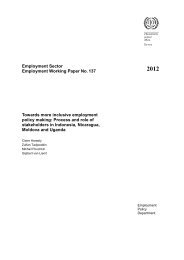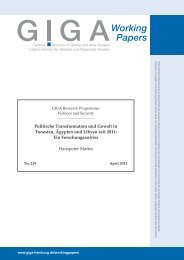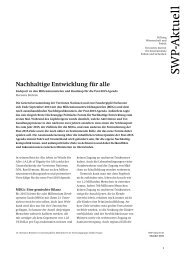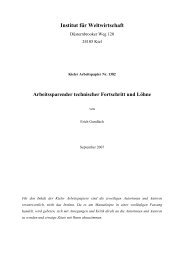Authoritarian Rule and Democracy in Africa: A Theoretical Discourse
Authoritarian Rule and Democracy in Africa: A Theoretical Discourse
Authoritarian Rule and Democracy in Africa: A Theoretical Discourse
You also want an ePaper? Increase the reach of your titles
YUMPU automatically turns print PDFs into web optimized ePapers that Google loves.
agriculture for their ma<strong>in</strong> source of livelihood. Rural populations are the major source ofnational food supplies, export revenues <strong>and</strong> <strong>in</strong>dustrial development (Barraclough, 1990;Mamdani, 1986 <strong>and</strong> 1987). By rural-urban <strong>in</strong>tegration, I underst<strong>and</strong> the process of susta<strong>in</strong><strong>in</strong>gthe economic, social <strong>and</strong> political life of rural communities, lead<strong>in</strong>g to a transformation of thestructures of dualism that have underp<strong>in</strong>ned all facets of rural-urban relations. Low levels ofnational <strong>in</strong>tegration restrict democratization to an urban phenomenon, relegate peasants to thefr<strong>in</strong>ges of civil society, <strong>and</strong> underm<strong>in</strong>es their ability to develop national strategies <strong>and</strong> enter<strong>in</strong>to broad democratic coalitions.The alienation of rural societies from the ma<strong>in</strong>stream of national life exposes the peasantry tocont<strong>in</strong>ued manipulation from state authorities <strong>and</strong> rural/urban patrons, anxious to ma<strong>in</strong>ta<strong>in</strong>authoritarian forms of rule. Solv<strong>in</strong>g the rural-urban dilemma may, <strong>in</strong> fact, provide the basisfor com<strong>in</strong>g to terms with the problems of unbalanced ethnic <strong>and</strong> regional development. Theresolution of this dilemma should obviously give prom<strong>in</strong>ence to the transformation of theregulatory mechanisms that have underm<strong>in</strong>ed the <strong>in</strong>dependence of petty producers, <strong>and</strong>provide support for the dynamics of petty accumulation. This boils down to a question ofmak<strong>in</strong>g economic development <strong>and</strong> democracy national projects, as opposed to the currentpractice where they are ma<strong>in</strong>ly an urban phenomenon dom<strong>in</strong>ated by the power élites. Table 2shows how this issue is related to the six different models of accumulation.A stable <strong>and</strong> susta<strong>in</strong>able democracy must also be able to create a social system that willaccommodate the conflict<strong>in</strong>g claims of diverse groups <strong>in</strong> society. The social groups rema<strong>in</strong>committed to the fundamentals of the exist<strong>in</strong>g order while compet<strong>in</strong>g, sometimes militantly,for overall dom<strong>in</strong>ance. Classical liberalism relies on the depoliticiz<strong>in</strong>g functions of the marketas the bedrock for the construction of such a stable social order. The hegemony of thecapitalist class is presented as anonymous <strong>and</strong> the losses <strong>in</strong>flicted by the market ondisadvantaged groups is <strong>in</strong>terpreted as a natural fate which can befall all <strong>in</strong>dividuals(Lawrence, 1989). In this context, liberals see democracy as the natural political shell ofcapitalism.There is, however, no natural correspondence between capitalism <strong>and</strong> democracy (Therbon,1977). All capitalist economies, however advanced, must devise social systems that willsusta<strong>in</strong> democratic rule. Such systems must provide welfare/economic support, howevercontestable, for the deprived majority to exercise their formal democratic rights, which <strong>in</strong> turnshould allow them to susta<strong>in</strong> <strong>and</strong> develop their livelihood aspirations. Western democracieswere consolidated <strong>in</strong> the post-1945 period with the construction of welfare states. Socialdemocratic parties provided political leadership to restless workers <strong>and</strong> deprived groups tousher <strong>in</strong> the so-called “historic class compromise”. Social democracy has strong built-<strong>in</strong>elements of corporatism as governments try to balance the conflict<strong>in</strong>g dem<strong>and</strong>s of unions <strong>and</strong>the organized private sector. The lead<strong>in</strong>g actors <strong>and</strong> their organizations barga<strong>in</strong> with the stateas <strong>in</strong>dependent entities but their co-optation <strong>in</strong>to the policy apparatus entails majorcompromises, <strong>in</strong>clud<strong>in</strong>g the regulation of the behaviour of their members (Cawson, 1989;Carter, 1989).The corporate type of social control is contrasted with social contracts <strong>in</strong> which the rul<strong>in</strong>gauthorities def<strong>in</strong>e the rules <strong>and</strong> regulate the participation of the other contestants. Invariablythe contend<strong>in</strong>g social actors are denied autonomous political space to canvass for the views<strong>and</strong> <strong>in</strong>terests of their members. The social contract is top-down <strong>and</strong> authoritarian. Despite itsauthoritarian character, its legitimacy may rest on relatively high levels of welfare. The levelof this type of welfare may be lower than the corporate type because of the low level ofdevelopment <strong>and</strong> the political constra<strong>in</strong>ts imposed on the barga<strong>in</strong><strong>in</strong>g positions of social actors.Another type of social control is patron-client arrangements which can operate <strong>in</strong> both formaldemocracies <strong>and</strong> authoritarian systems. Where patron-client relations susta<strong>in</strong> democratic rule,the contend<strong>in</strong>g groups <strong>and</strong> their organizations may enjoy formal autonomy, but the political11






